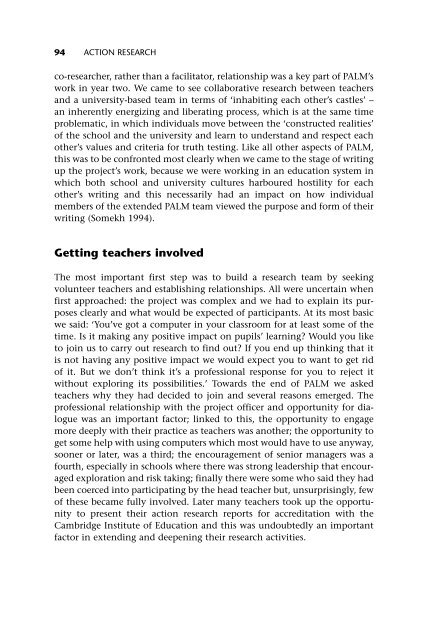Action Research A Methodology for Change and Development
Action Research A Methodology for Change and Development
Action Research A Methodology for Change and Development
Create successful ePaper yourself
Turn your PDF publications into a flip-book with our unique Google optimized e-Paper software.
94 ACTION RESEARCH<br />
co-researcher, rather than a facilitator, relationship was a key part of PALM’s<br />
work in year two. We came to see collaborative research between teachers<br />
<strong>and</strong> a university-based team in terms of ‘inhabiting each other’s castles’ –<br />
an inherently energizing <strong>and</strong> liberating process, which is at the same time<br />
problematic, in which individuals move between the ‘constructed realities’<br />
of the school <strong>and</strong> the university <strong>and</strong> learn to underst<strong>and</strong> <strong>and</strong> respect each<br />
other’s values <strong>and</strong> criteria <strong>for</strong> truth testing. Like all other aspects of PALM,<br />
this was to be confronted most clearly when we came to the stage of writing<br />
up the project’s work, because we were working in an education system in<br />
which both school <strong>and</strong> university cultures harboured hostility <strong>for</strong> each<br />
other’s writing <strong>and</strong> this necessarily had an impact on how individual<br />
members of the extended PALM team viewed the purpose <strong>and</strong> <strong>for</strong>m of their<br />
writing (Somekh 1994).<br />
Getting teachers involved<br />
The most important first step was to build a research team by seeking<br />
volunteer teachers <strong>and</strong> establishing relationships. All were uncertain when<br />
first approached: the project was complex <strong>and</strong> we had to explain its purposes<br />
clearly <strong>and</strong> what would be expected of participants. At its most basic<br />
we said: ‘You’ve got a computer in your classroom <strong>for</strong> at least some of the<br />
time. Is it making any positive impact on pupils’ learning? Would you like<br />
to join us to carry out research to find out? If you end up thinking that it<br />
is not having any positive impact we would expect you to want to get rid<br />
of it. But we don’t think it’s a professional response <strong>for</strong> you to reject it<br />
without exploring its possibilities.’ Towards the end of PALM we asked<br />
teachers why they had decided to join <strong>and</strong> several reasons emerged. The<br />
professional relationship with the project officer <strong>and</strong> opportunity <strong>for</strong> dialogue<br />
was an important factor; linked to this, the opportunity to engage<br />
more deeply with their practice as teachers was another; the opportunity to<br />
get some help with using computers which most would have to use anyway,<br />
sooner or later, was a third; the encouragement of senior managers was a<br />
fourth, especially in schools where there was strong leadership that encouraged<br />
exploration <strong>and</strong> risk taking; finally there were some who said they had<br />
been coerced into participating by the head teacher but, unsurprisingly, few<br />
of these became fully involved. Later many teachers took up the opportunity<br />
to present their action research reports <strong>for</strong> accreditation with the<br />
Cambridge Institute of Education <strong>and</strong> this was undoubtedly an important<br />
factor in extending <strong>and</strong> deepening their research activities.

















